Chemical Engineering
Chemical Engineering News Archive
Chemical Engineering Grad Student Wins 2nd Place in American Fisheries Society
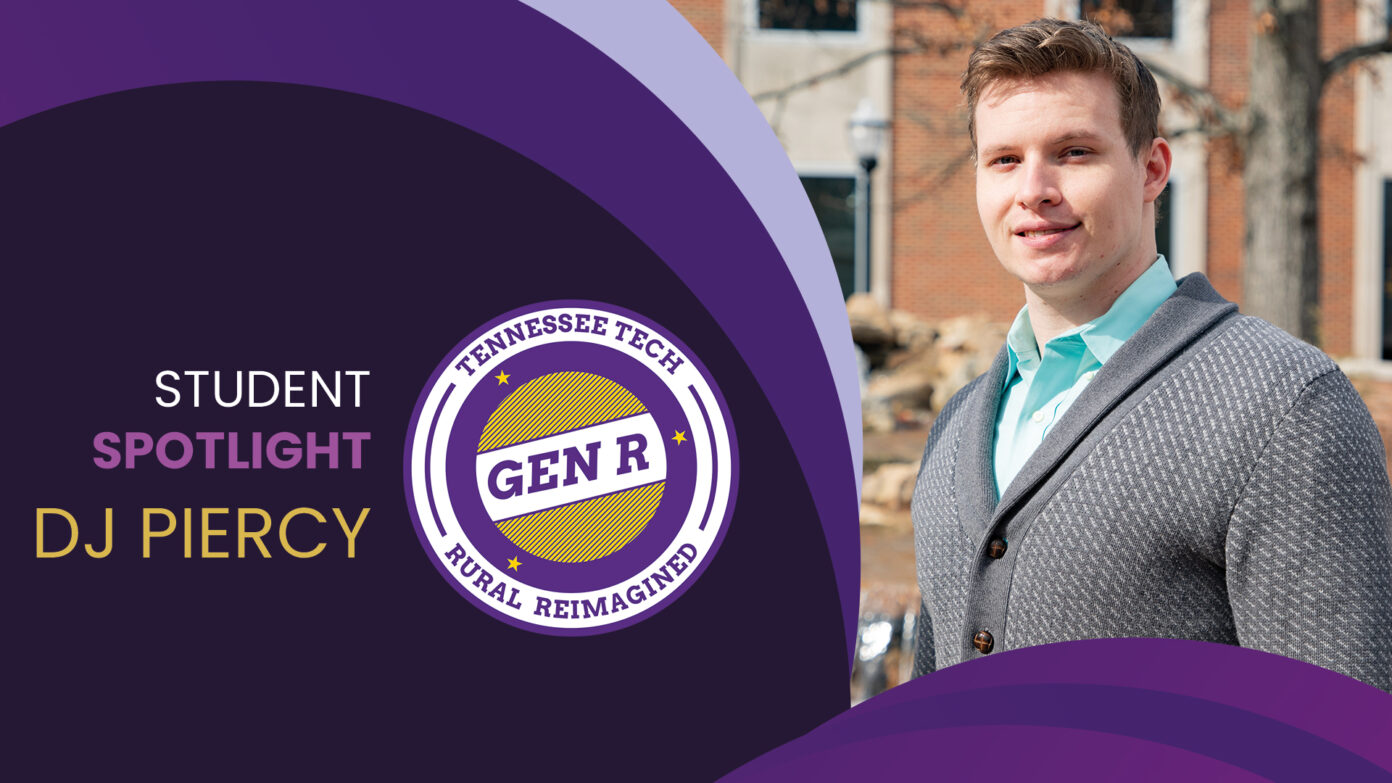
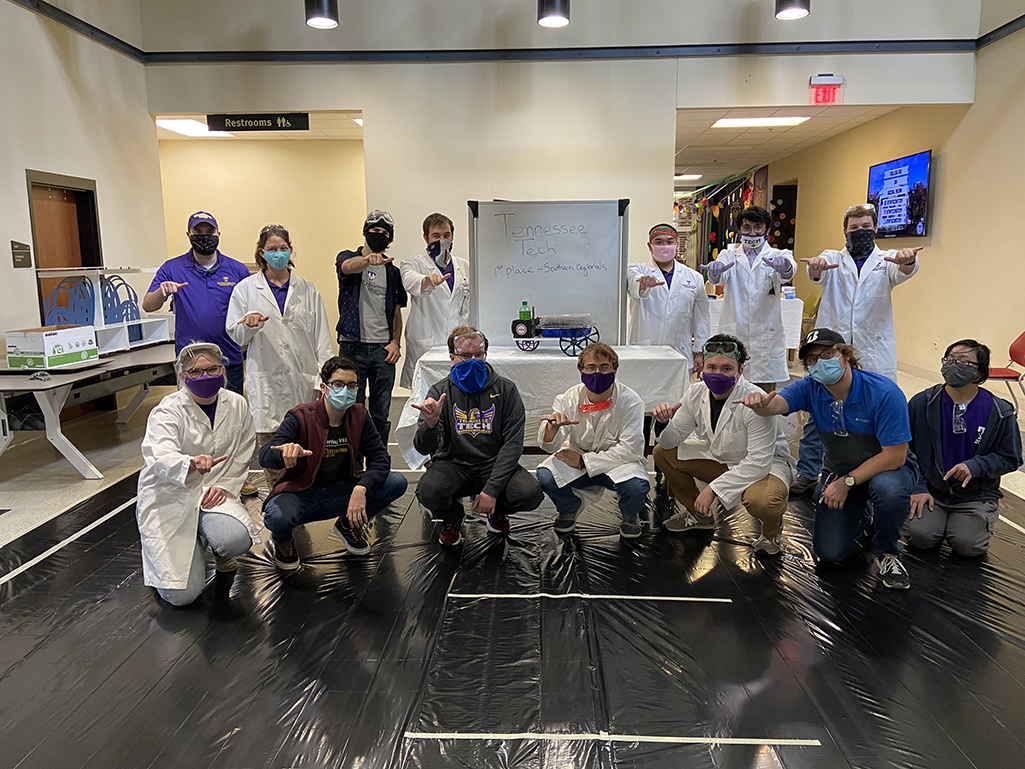 Congratulations to the CHE Car Team - 1st place in Regionals 2020.
Congratulations to the CHE Car Team - 1st place in Regionals 2020.
On to Nationals................!!
Join us in congratulating Shelley Edwards, recipient of 2020 Derryberry Award!
The Derryberry Award is the highest honor bestowed to graduating students at Tennessee
Tech!
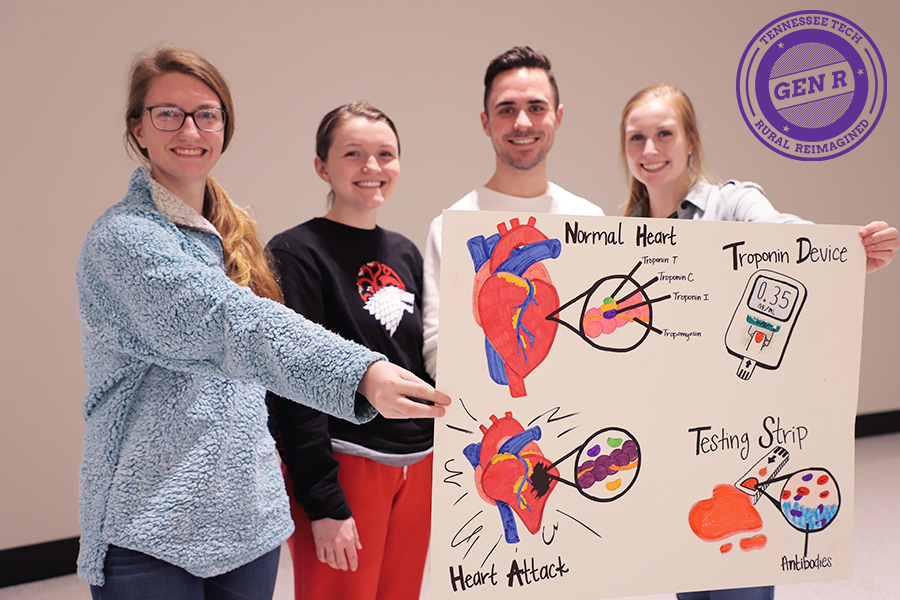
The Grand Challenge congratulates Mackenzie Pugh, Shelley Edwards, Jordan Barnett, and Cody Bowerman for winning the Rural Reimagined Award of $500 last week for their project “Serious as a Heart Attack!” The team of chemical engineering and nursing students are working to create a device that tests for troponin, a protein that is released into the bloodstream when a heart attack is occurring or about to occur. The device will be extremely helpful to those in rural communities with long waits for ambulances to arrive, as they can test their troponin levels to see if they are actually experiencing a heart attack or not. As Stephen Shepherd, a recent TN Tech graduate and one of the original team members states, “it would save everyone money and not waste viable resources that could potentially be used for other life-threatening emergencies.” The team will use the $500 from the challenge to continue researching and developing a prototype, and they’re excited for the device’s future! Click here to see the team talk about their work.
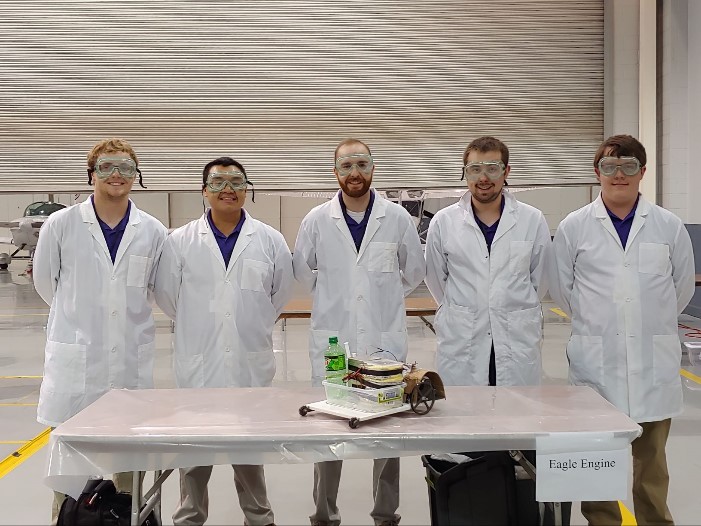
The Chemical Engineering department is full of students that take charge and lead
various events that help build a sense of community within the department. Our student
organizations, AIChe and CEGRA, help empower chemical engineering students in these
endeavors. These events range from barbecues and networking nights to chemical engineering
conferences and competitions.
Click here to learn more about what AIChe and CEGRA have been doing
Tennessee Tech PhD graduate Phaneedra Kondapi was recognized by the Society of Petroleum
Engineers (SPE). He will receive the SPE's Projects, Facilities, and Construction
award, which recognizes outstanding achievements and/or contributions that advance
the field of petroleum engineering in the technical area of projects, facilities and
construction. Dr. Kondapi currently serves as the interim assistant dean and founding
director for engineering programs at University of Houston at Katy. He graduated with
a PhD in chemical engineering from Tennessee Tech in 2000. To read more, visit
https://www.egr.uh.edu/news/201908/uh-engineering-faculty-earn-international-recognition-society-petroleum-engineers

J.P. Cisco saw first-hand the back pain suffered by his disabled uncle — and the relief he found from CBD oil derived from cannabis plants as an alternative to more addictive opioids and other pain relief medicines. So when Sanofi announced plans last year to cut some of the operations at Chattem where Cisco worked as a production manager, the 28-year-old Hixson native decided to try to start his own business in Tennessee's newly legalized industrial hemp market... Read more
Thank you to Eastman Chemical Company for generously donating several hardhats with
our department logo to our Unit Ops lab!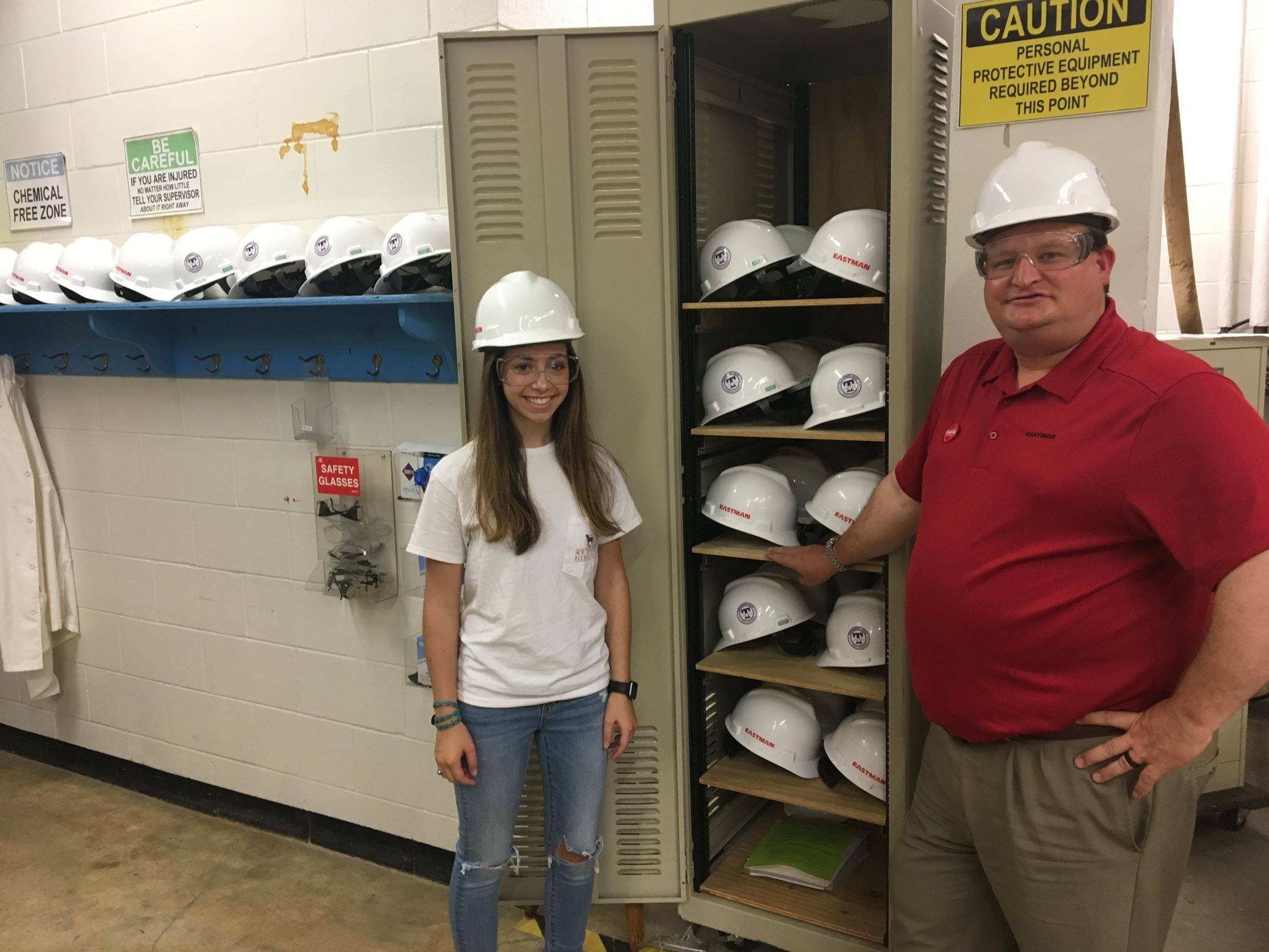
“Doctoral Student Nastasia Allred received the Directors’ Award of the Computer and System Technology (CAST) Division of the AIChE for her poster presentation on modeling hyperthermia treatment for cancer tumors. Congrats Nastasia for this prestigious national division award.”
Bo Bonning, Carnegie PhD Student, won best paper of the symposium award for his oral
presentation at the Annual National AICHE (Fall 2018)
Congratulations Bo!
Dr. N. Helen Okoye, 2016 PhD in Chemical Engineering has been offered and accepted a position at the Warren Research Center, General Motors, MI to help with the design and optimization of materials for the batteries of the new generation of electrical cars. She is the first PhD from Tennessee Technological University to receive such an opportunity.
Dr. Pedro E. Arce delivered a Departmental Seminar at the Department of Chemical and Biomolecular Engineering, Rutgers University, NJ on March 24, 2016. Dr. Arce overviewed his work (with students and collaborators) on the Hydrogel Technologies for Health Care Engineering Applications.
Dr. Rocio Tijaro-Rojas, 2015 PhD in Chemical Engineering and an Assistant Professor of Environmental Engineering at the Arturo Pratt University, Iquique, Chile has received a competitive $500K research grant to develop a new bioreactor for plastic material recycling.
A Team of Chemical Engineering Faculty (Dr. J. Pascal, Dr. J. R. Sanders, Dr. P. E. Arce) in collaboration with Dr. Laura Cruz (Teaching and Learning Center) have received the first Steelcase Foundation Grant to build the "Steelcase Foundry Room" that will enhance the transformational learning at Tennessee Tech based on the Renaissance Foundry Model (Spring 2016). The grant is one out of six among more than 800 applications received by the Foundation.
Dr. Holly Stretz was a Sabbatical Leave Professor at the ORNL (Fall 2015) working on the fundamental sciences of the 3D printing technology.
Dr. J. R. Sanders and Dr. Melissa Geist (School of Nursing) have received the first ever Venture Well Foundation Grant for the piloting of the "Clinical Immersion Course" that offer a unique learning interface between chemical engineering and nursing students (2015). The grant is a very competitive national source for innovation-driven learning with entrepreneurship.
Dr. Pedro E. Arce, University Distinguished Faculty Fellow and Professor and Chair of Chemical Engineering received the 2015 Caplenor Award for excellence in research. The Donald Caplenor Award is the most prestigious award in research at Tennessee Tech.
A paper co-authored by Chemical Engineering Faculty (Dr. Arce, Dr. Biernacki, Dr. Pascal and Dr. Sanders) with students and collaborators received the Thomas C. Evans Award (2014) from the ASEE and the ASEE Zone II Best Paper Award (2015). The paper will be a featured presentation at the ASEE National Meeting of the ASEE (New Orleans, 2016)
Dr. J. R. Sanders received the University Outstanding Teaching Award (2015) and the first Provost Advising Award (2015) for his outstanding contributions to the student learning pedagogy and mentoring students.
Dr. Pedro E. Arce, Professor and Chair of Chemical Engineering received the 2013-14 University Outstanding Faculty for Professional Service.
Chemical Engineering Professor Receives Kinslow Engineering Research Award
Dr. Cynthia Rice was awarded the Kinslow Engineering Research Award for her significant
contributions to the fields of fuel cell technology and electrochemistry. The Kinslow
Award was established to recognize high-quality, archival publications by Engineering
faculty members at Tennessee Tech.
Chemical Engineering Chair is Awarded the Idahlynn Karre Exemplary Leadership Award
Dr. Pedro Arce, Professor and Chair of Chemical Engineering, was selected to receive
The Chair Academy’s 2014 Idahlynn Karre Exemplary Leadership Award. This award recognizes
their ability to advance academic and administrative leadership on Tennessee Tech's
campus.
ChemE Student Azurae Johnson Wins Service Award for Volunteer Work with Big Brothers Big Sisters Program
Dr. Joseph J. Biernacki awarded the 2011 University Distinguished Faculty Fellow

Concrete is the most ubiquitous building material on Earth. Biernacki hopes
that his work will contribute to making this important material more compatible
with the environment.
College of Engineering Outstanding Staff Award 2014 Presented to Becky Asher
The Outstanding Staff Award 2014 Presented to Becky Asher for Excellence in Job Performance,
Attitude, and Commitment in the College of Engineering. Mrs. Asher enjoys working
with the chemical engineering students and across university units. She especially
enjoys her department's collaborative approach within the College of Engineering and
other departments, including business, chemistry, education and nursing. She feels
the faculty and staff work together well to assist students in achieving their ultimate
goal, a degree in chemical engineering.
Arce named 2010 Distinguished Faculty Award winner
Chemical engineering professor Pedro Arce dreamed of being a college professor as a boy when working on the fields of his parents' farming community in South America, and now the dream has turned to distinction after receiving the Distinguished Faculty Award from Tennessee Tech University. The award not only honors Arce's notable record while serving as Tennessee Tech's chemical engineering department chairperson, but also points to the promising trajectory of his career. It is the highest recognition beyond tenure for a Tennessee Tech faculty member. A key criterion for the Distinguished Faculty Award recognizes faculty who have made significant contributions toward providing external recognition to the university. Tennessee Tech College of Engineering Dean David Huddleston says Arce's contributions fall into three key areas relevant to the university's mission: active-collaborative learning, scholarly and technological developments, and curriculum and department leadership.
"He has embraced the broad definition of a university educator," Huddleston said.
Richard M. Felder, Hoechst Celanese professor emeritus of chemical engineering at North Carolina State University and author of the introductory chemical engineering textbook used by about 90 percent of U.S. universities, says Arce is one of those rare individuals who manages to excel at every aspect of a faculty career. "He has disseminated his innovations extensively in national and international forums and is widely recognized as one of the world's premier authorities in engineering education," said Felder. In educational efforts, Arce has assembled four unique systems, among other tools, for learning: the Colloquial Approach, the Coach Model of Instruction, the High Performance Learning Environment, or Hi-PeLE, and the Personalized Course Binder.
These models garner national and international attention because the students, not the instructor, are at the center of their own learning and are mentored to think creatively and independently. The instructor is replaced by a facilitator of learning with highly effective coaching ability.
"The essence of his strategy is simple," said Joe Biernacki, Tennessee Tech chemical engineering professor. "Whenever you replace an instructor-led explanation with a student-led activity, you've created a high-performance learning environment. "
This relatively simple principle fosters a change of paradigm in engineering education, where the student drives the learning by focusing on processes rather than on end results.
In scholarly and technological developments, Arce has co-authored with his students more than 120 peer-reviewed articles, proceedings, publications and invited chapters. His efforts also have led to three patents: one in advanced oxidation processes and two pending in gel-technology; others are under consideration. His scholarly work is complemented by his efforts in mentoring 56 students related to doctoral, master's degrees or Distinction in the Major certificates. His research and learning community comprises students from the United States, Nigeria, India, Iran, Colombia, Peru and Chile. As a mentor, Arce focuses on student's development and not on student outcomes. Thesis, papers and presentations must be only measured intimately as part of the student's success, Arce says." To Dr. Arce, developing the individual student as a professional, productive member of the field of chemical engineering is paramount," said Jennifer Pascal, a Tennessee Tech doctoral student. "First and foremost, he cares about the well being of the student and provides constant encouragement which enhances their productivity."
Dr. Arce is not merely a mentor for research, but also guides students in their professional lives," Pascal added. "After having worked with Dr. Arce for over five years as an undergraduate and graduate researcher, I cannot ask for a better mentor."
Under Arce's leadership, Tennessee Tech's chemical engineering enrollment has more than doubled as departmental faculty have embraced and implemented his philosophies. The National Science Foundation invited him to give the keynote address for the annual meeting of Engineering Research Centers in Washington, D.C., and the Chemical Engineering Association of Argentina recently chose him for the opening plenary lecture of its bi-annual meeting. He also was the only invited member of the six four-year Tennessee Board of Regents universities to participate at its Advanced Leadership Academy. As an administrative leader, Arce introduced several innovations including a successful concentration in biomolecular engineering and a new computational platform for learning. He's also elevated research at the undergraduate level by developing the Distinction in the Major program.
All this had been accomplished through his cabinet-style leadership, where faculty, students and staff work as a team to promote student excellence and success, which are the primary focus of his leadership efforts. Since Arce's days as a graduate student, Purdue University's Burton and Kathryn Gedge Distinguished Professor G.V. Reklaitis, a member of the National Academy of Engineering, has followed Arce's career and calls him a change agent within the profession." He has abundantly confirmed the promise of those early years," said Reklaitis. "It really is amazing to me that he manages to mentor a group of five doctoral students, four master's students, one postdoctoral fellow, and three undergraduate research students while also innovating in education and leading the department."
As a member of Arce's department, Biernacki echoes that sentiment." It is almost inconceivable to me that any faculty member can be so dedicated to teaching and learning and at the same time support a research program as deep," said Biernacki. Huddleston says the Distinguished Faculty Award highlights Arce's passion and vision." He wants to bring Tennessee Tech to a place of recognition and value for the development of the future engineers as innovative agents of transformation." The Tennessee Tech Distinguished Faculty Award fits Arce very well since he envisions a national reputation with a regional emphasis for the university. He says he strongly believes that Tennessee Tech must be a prime leader in technology innovation and in developing what he calls the "Creative Class" of the 21st Century. His current goals include seeing the chemical engineering department as a national model of student excellence within a balanced approach to research and education, building consensus for a National Hi-PeLE Institute, and helping to catalyze a master plan leading to a Tennessee Tech Park for Technology Innovation and Business Entrepreneurship that would attract high-tech business to Tennessee Tech's area of influence. Arce is a graduate of the Universidad Nacional del Litoral, Santa Fe, Argentina, with a diploma in chemical engineering. He has both a master of sciences degree and a Ph.D. in chemical engineering from Purdue University (West Lafayette, Ind.) and holds one postgraduate certificate in English Studies (British Council, UK) and two in Academic and Advanced Leadership (Chair Academy and Tennessee Board of Regents) in addition to a Postgraduate Research Training (National Research Council of Argentina). He joined Tennessee Tech in 2003.
Two Tennessee Tech Employees Win Outstanding Clerical Awards
One of them was our own department secretary, Becky Asher. Asher is perhaps the best advocate a student majoring in chemical engineering can have. When one student was hospitalized with viral meningitis and unable to return to school, Asher willingly stepped up to assist the student in maintaining contact with professors and keeping abreast of the latest changes at Tennessee Tech. And when an auto accident prevented this same student from returning to school again, Asher helped again to provide much-needed assistance."
Once again, she stepped in to make certain [our son] had everything required for him to graduate this May," the student's father wrote in support of Asher's nomination for the recommendation. "We cannot express in words our gratitude for such an exemplary employee at Tennessee Tech and are very thankful for all the assistance Mrs. Asher has provided. "
Asher was nominated for the award by her department's chairperson, Pedro E. Arce, who described Asher's professionalism as among the best. Arce cited Asher's expertise in helping the department upgrade to a mobile laptop computing environment for students. Asher's management of the changeover successfully pushed the project forward so that renovations could be completed cost-effectively. "She is an amazing staff colleague that matches very few that I have had the chance to observe in my career," Arce said. "Her very positive and smiley personality is always a welcoming greeting for all who need her assistance."
Asher began working at Tennessee Tech in 2006 in the Office of Academic Affairs. She joined the chemical engineering department in January 2007.
Dr. Pedro E. Arce was the opening plenary lecture speaker of the VI Annual Meeting of the Chemical Engineering Association of Argentina, Mar del Plata, Argentina, October 2010; he also was a plenary speaker for the NSF-ERC Annual Meeting in Washington DC, November 2009. Dr. Arce highlighted his successful Hi-PeLE Learning Environment for enhancing Innovation and Creativity in Engineering Education.
Jennifer A. Pascal, the first student directly admitted to our Engineering PhD program and a Diversity Fellowship Award at Tennessee Tech, is a winner of a 2010 AIChE Separations Division Graduate Student Award. This is a highly competitive award with a global request for nominations. The award is sponsored by the Praxair, Inc. and the AIChE Separations Division.
Ms. Chinyere Mbachu (Chi-Chi) has received several prestigious awards for supporting her graduate studies at Tennessee Tech..
Biernacki wins 2009 Caplenor Faculty Research Award
Two Tennessee Tech University researchers adept at integrating research and teaching responsive to the needs of U.S. and worldwide industries have been honored as winners of the university’s most prestigious research award. Mohamed Abdelrahman, electrical and computer engineering professor, and Joe Biernacki, chemical engineering professor, are the 2009 Caplenor Faculty Research Award recipients.
Meet Nemoy Rau-AICHE's featured young professional of the year!
Ever wonder how our graduates are doing out in the real world? In an interview with CHEneccted, this Tennessee Tech graduate discusses his profession, challenges he faces every day and the all-important question - how many Chemical Engineers does it take to change a light bulb?
Top of the Class: Lindsey Reed named Tech's NCAA Woman of the Year
"She embodied what it meant to give back," said Coach Daniel Brizard.
"These last four years have taught me dedication," Reed said.
Lindsey showed that with one of the toughest degrees you can get at this school that you can have the balance by being successful on the soccer field.
Biernacki appointed to Journal Editorial Board
Dr. Joseph Biernacki, Professor of Chemical Engineering, was recently appointed to be an associate editor of the Journal of the American Ceramic Society.
Two Chemical Engineering Researchers Take On The Challenge of Concrete - Tech Times Article - Submitted by Karen Lykins
We walk on it, work in structures built with it, drive on it and for the most part take for granted our use of the most abundant synthetic material on earth—Portland cement concrete.
But researchers around the world remain baffled in many ways about the behavior of a material made from the most plentiful and simple raw materials. It’s hard to predict how long it will last, how badly it will crack and how much negative environmental impact it will make.
At Tennessee Tech University, colleagues and chemical engineering researchers Joe Biernacki and Don Visco are working to help unravel some of the mystery surrounding concrete. The American Ceramic Society, ACerS, recently featured their work in a publication dedicated to highlighting cement researchers who are working to bring new strength, flexibility, self-healing capacities and a smaller CO2 footprint to concrete.
Biernacki says modern concrete just doesn’t last long enough, and one way to reduce the environmental impact is to double, triple or even quadruple its life expectancy in the field.
“In an ideal world, we would produce cements that had no carbon footprint. The work we do we link to the environment,” Biernacki said. “If we can make concrete last twice as long, just a factor of two would be remarkable. It would certainly make concrete more environmentally friendly.”
The Tennessee Tech duo developed a technique for encoding the structure of molecules that have a particular performance behavior. They run the data through a computer model to correlate performance and predict new molecular structures to enhance performance.
“We hope to design entirely new molecules with targeted performance enhancing characteristics,” Biernacki said. “This has the potential to enable the design of concrete mixtures with unique rheological [the flow under stress and strain] properties, for example.”
Biernacki also summarized the enigmatic challenges of concrete research in a recent article.
He says more than 2,000 years after the Romans built great and enduring structures using hydraulic cements, modern science is still baffled about the behavior of concrete because there is no unifying theory.
“It’s limestone, shale, stones and water. What’s so baffling? It’s simple, burn the limestone and shale to produce some calcium silicates and calcium aluminates, add a bit of gypsum, grind into a powder, put some stones in, mix with water and let it set. No big deal, right?
“Unfortunately, the resulting concoction turns out to be incredibly complex,” Biernacki explained.
To add to the challenge, the final and important steps to creating concrete take place in the field by necessity. Environmental conditions play a huge part in the final product.
Finally, concrete is not one material, but a spectrum of materials designed to match the application. Some must be strong, some porous, and some tough.
“Controlling the properties is the key,” said Biernacki. “Not just making a lot of it the same every day.
“Ultimately, we are working to alter the kinetics of hydration to unlock the elusive secrets of this important material.”
Chemical Engineering Undergraduate Student Chosen to Represent the College of Engineering for Posters at the Capitol
Antonio Pistono better know to us as Tony has been chosen as the College of Engineering representative for the Posters at the Capitol event on February 3 at the Tennessee Capitol. This event highlights undergraduate research at the state universities in Tennessee. Tony will have a poster presentation within the legislative complex, a possible chance to meet with his local representative and senator, and answer questions about his work from those passing through the halls of the legislative office areas.
Biernacki wins 2009 Caplenor Faculty Research Award
Two Tennessee Tech University researchers adept at integrating research and teaching responsive to the needs of U.S. and worldwide industries have been honored as winners of the university’s most prestigious research award. Mohamed Abdelrahman, electrical and computer engineering professor, and Joe Biernacki, chemical engineering professor, are the 2009 Caplenor Faculty Research Award recipients.
Tennessee Tech Family Connection Lean More About Our Programs

